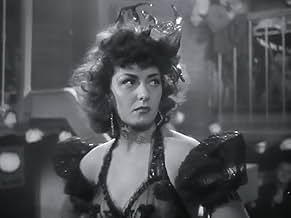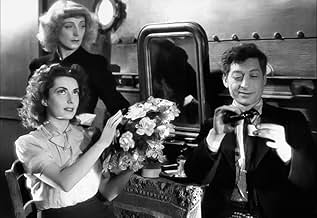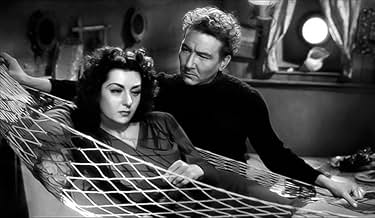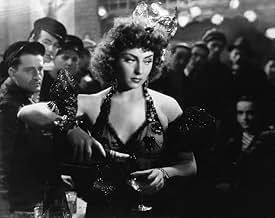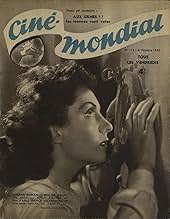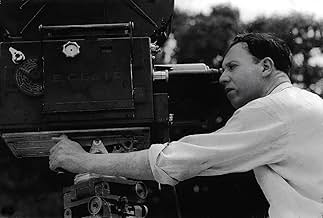Füge eine Handlung in deiner Sprache hinzuThe imaginary voyage of a woman gone blind on her former lover's boat.The imaginary voyage of a woman gone blind on her former lover's boat.The imaginary voyage of a woman gone blind on her former lover's boat.
Jean Aquistapace
- Indigo
- (as Aquistapace)
Sylvie Gance
- Mireille
- (as Mary-Lou)
Rocca
- Le chanteur
- (as Roquefort)
Roland Pégurier
- Le mousse
- (as Le petit Pégurier)
Gérard Landry
- Gazul
- (Nicht genannt)
Géo Lecomte
- Le quartier-maître
- (Nicht genannt)
Jean-François Martial
- Un ami
- (Nicht genannt)
Handlung
WUSSTEST DU SCHON:
- WissenswertesAccording to Viviane Romance's autobiography, following artistic differences between Abel Gance and herself, most of the scenes she appears in (one third of the film) were in fact directed by Edmond T. Gréville.
- VerbindungenEdited into Geschichte(n) des Kinos: La monnaie de l'absolu (1999)
- SoundtracksJe vous Déteste, les Hommes
Music by Raoul Moretti
Lyrics by Raoul Moretti and Abel Gance
Performed by Viviane Romance
Ausgewählte Rezension
"And if I ever lose my eyes(...) I won't have to cry anymore " (Cat Stevens) "Venus Aveugle" is Abel Gance at his kitschest, a melodrama which makes Stahl and Sirk look like Robert Bresson.After watching that,all you have got to do is either have a good laugh or stand and applaud.
I will stand and applaud.Nobody does stuff like that nowadays and nobody certainly will.
Clarisse (nicknamed "Venus" for a good reason)learns she 'll become blind in a year or two .Although she's pregnant by her lover Madère ,she pretends she has cheated on him and he leaves her.The story is trite but the treatment is not .If you are a melodrama buff,the film contains scenes that will leave you on the edge of your seat.
Clarisse and the ophthalmologist:Gance uses shots in close-up ,enhancing Viviane Romance's beauty:the actress is cast against type for she generally plays bitchy parts or villains such la Comtesse de la Motte of the necklace affair long before Hilary Swank.Paradoxically ,she was perhaps never better than here ;Gance put the weight of a very long movie (145 min)on her and she carried it brilliantly.
Madère and his boat "Le Tapageur" (the noisy one): it plays the same part as the train in "la roue" .One can really speak of the dynamic of Gance.As historian Jean Tulard wrote :"he invented a technique which allowed him to mix inanimate objects and the characters' life ".Madère 's boat is alive :you can hear it cry,sigh ,become part of the heroes' plight.
Gance's depiction of Clarisse's progressive blindness is stunning and compares favorably with what he did with Beethoven's deafness in "Un Grand Amour de Beethoven" (1936).Using close-ups, blurred pictures,light and darkness,he transcends melodrama and makes art.
Of course there are "enough is enough " scenes : as it often happens in Gance's canon,all that takes place in churches reaches unbelievable heights of kitch ("Paradis Perdu" (1939)-"le Roman d'un Jeune Homme Pauvre" (1935)) : two processions enter the church as the congregation and a soloist break into a heartrending canticle ;the first one is a funeral:Clarisse all dressed in black has lost his child ;the second one is the christening of her rival's little girl .What director would dare that today?
The last part of the movie is an illustration of Seneque's sentence which opens the film: "When you have lost all your hopes ,you have got nothing to despair of".Stahl's and Sirk's fans will notice the similarity between "Venus Aveugle" and "magnificent obsession" .During twenty minutes (you read well) all Clarisse"s friends try to bring eyesight to the blind and they take her to an imaginary voyage on the "Tapageur" .Her crippled sister describes for her the "landscapes" of the countries they "visit".It's so over the top it becomes sublime.
This is another must by one of the true pioneers of the cinema.
Had Lars Von Trier lived in the forties,that would have been his "breaking the waves" !
NB :Ginette Leclerc,they say,did not get on very well with the director who did not direct many of the scenes.
I will stand and applaud.Nobody does stuff like that nowadays and nobody certainly will.
Clarisse (nicknamed "Venus" for a good reason)learns she 'll become blind in a year or two .Although she's pregnant by her lover Madère ,she pretends she has cheated on him and he leaves her.The story is trite but the treatment is not .If you are a melodrama buff,the film contains scenes that will leave you on the edge of your seat.
Clarisse and the ophthalmologist:Gance uses shots in close-up ,enhancing Viviane Romance's beauty:the actress is cast against type for she generally plays bitchy parts or villains such la Comtesse de la Motte of the necklace affair long before Hilary Swank.Paradoxically ,she was perhaps never better than here ;Gance put the weight of a very long movie (145 min)on her and she carried it brilliantly.
Madère and his boat "Le Tapageur" (the noisy one): it plays the same part as the train in "la roue" .One can really speak of the dynamic of Gance.As historian Jean Tulard wrote :"he invented a technique which allowed him to mix inanimate objects and the characters' life ".Madère 's boat is alive :you can hear it cry,sigh ,become part of the heroes' plight.
Gance's depiction of Clarisse's progressive blindness is stunning and compares favorably with what he did with Beethoven's deafness in "Un Grand Amour de Beethoven" (1936).Using close-ups, blurred pictures,light and darkness,he transcends melodrama and makes art.
Of course there are "enough is enough " scenes : as it often happens in Gance's canon,all that takes place in churches reaches unbelievable heights of kitch ("Paradis Perdu" (1939)-"le Roman d'un Jeune Homme Pauvre" (1935)) : two processions enter the church as the congregation and a soloist break into a heartrending canticle ;the first one is a funeral:Clarisse all dressed in black has lost his child ;the second one is the christening of her rival's little girl .What director would dare that today?
The last part of the movie is an illustration of Seneque's sentence which opens the film: "When you have lost all your hopes ,you have got nothing to despair of".Stahl's and Sirk's fans will notice the similarity between "Venus Aveugle" and "magnificent obsession" .During twenty minutes (you read well) all Clarisse"s friends try to bring eyesight to the blind and they take her to an imaginary voyage on the "Tapageur" .Her crippled sister describes for her the "landscapes" of the countries they "visit".It's so over the top it becomes sublime.
This is another must by one of the true pioneers of the cinema.
Had Lars Von Trier lived in the forties,that would have been his "breaking the waves" !
NB :Ginette Leclerc,they say,did not get on very well with the director who did not direct many of the scenes.
- dbdumonteil
- 6. Aug. 2006
- Permalink
Top-Auswahl
Melde dich zum Bewerten an und greife auf die Watchlist für personalisierte Empfehlungen zu.
Details
- Erscheinungsdatum
- Herkunftsland
- Sprache
- Auch bekannt als
- Venus of Paris
- Drehorte
- Produktionsfirma
- Weitere beteiligte Unternehmen bei IMDbPro anzeigen
- Laufzeit2 Stunden 20 Minuten
- Farbe
- Sound-Mix
- Seitenverhältnis
- 1.37 : 1
Zu dieser Seite beitragen
Bearbeitung vorschlagen oder fehlenden Inhalt hinzufügen


